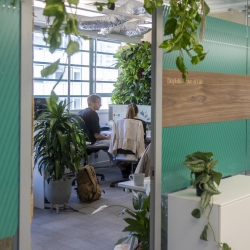To provide the best experiences, we use technologies like cookies to store and/or access device information. Consenting to these technologies will allow us to process data such as browsing behaviour or unique IDs on this site. Not consenting or withdrawing consent, may adversely affect certain features and functions.
The technical storage or access is strictly necessary for the legitimate purpose of enabling the use of a specific service explicitly requested by the subscriber or user, or for the sole purpose of carrying out the transmission of a communication over an electronic communications network.
The technical storage or access is necessary for the legitimate purpose of storing preferences that are not requested by the subscriber or user.
The technical storage or access that is used exclusively for statistical purposes.
The technical storage or access that is used exclusively for anonymous statistical purposes. Without a subpoena, voluntary compliance on the part of your Internet Service Provider, or additional records from a third party, information stored or retrieved for this purpose alone cannot usually be used to identify you.
The technical storage or access is required to create user profiles to send advertising, or to track the user on a website or across several websites for similar marketing purposes.
 A new report, Reap What You Sow: Valuing Workplaces that Grow Good Ideas from PLP Labs sets out to explain the process of measuring and monetising the wellbeing and environmental value of biophilic office design. The report argues that in corporate real estate, the environment impacts the bottom line. PLP’s study – run in collaboration with academics from Loughborough University, the University of Reading, and Benholm claims to enable real estate clients to fairly evaluate the worth of investing in nature alongside other project costs. (more…)
A new report, Reap What You Sow: Valuing Workplaces that Grow Good Ideas from PLP Labs sets out to explain the process of measuring and monetising the wellbeing and environmental value of biophilic office design. The report argues that in corporate real estate, the environment impacts the bottom line. PLP’s study – run in collaboration with academics from Loughborough University, the University of Reading, and Benholm claims to enable real estate clients to fairly evaluate the worth of investing in nature alongside other project costs. (more…)








 London’s most outstanding workplaces have been recognised with British Council for Offices Awards going to seven office buildings across the capital. Held at the London Hilton on Park Lane, the BCO’s annual London Awards Lunch recognised projects that demonstrate best practice in office design, fit-out, operation and sustainability, setting the standard for excellence across the sector.
London’s most outstanding workplaces have been recognised with British Council for Offices Awards going to seven office buildings across the capital. Held at the London Hilton on Park Lane, the BCO’s annual London Awards Lunch recognised projects that demonstrate best practice in office design, fit-out, operation and sustainability, setting the standard for excellence across the sector. 










 American employees are wasting hundreds of contracted work hours a year using their work equipment for personal tasks and activities, according to a new survey from ExpressVPN. The survey, conducted by the consumer privacy and security company, found that some people are spending only 33 percent of annual contracted hours on work tasks. With a steep rise in hybrid and home working in recent years, many companies have provided employees with work devices to use in the comfort of their own homes, including work laptops, desktops, phones, and microphones.
American employees are wasting hundreds of contracted work hours a year using their work equipment for personal tasks and activities, according to a new survey from ExpressVPN. The survey, conducted by the consumer privacy and security company, found that some people are spending only 33 percent of annual contracted hours on work tasks. With a steep rise in hybrid and home working in recent years, many companies have provided employees with work devices to use in the comfort of their own homes, including work laptops, desktops, phones, and microphones. 














March 24, 2023
Company culture is one of the hardest but most valuable things to get right after a merger
by Siobhan Byrnes • Business, Comment